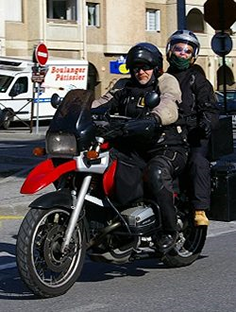 The Federation of European Motorcyclists Associations (FEMA) has commented on today’s press release from the EU Commission concerning the proposal for European wide Road Worthiness Testing (RWT) for PTWs (Powered Two Wheelers – motorcycles, scooters and mopeds).
The Federation of European Motorcyclists Associations (FEMA) has commented on today’s press release from the EU Commission concerning the proposal for European wide Road Worthiness Testing (RWT) for PTWs (Powered Two Wheelers – motorcycles, scooters and mopeds).
The Federation continues its call for the withdrawal of the introduction of mandatory annual technical inspections for all motorcycles in Europe, as it criticises the proposal as unnecessary and useless.
However according to the Commission’s press release there will be no change for UK riders at all.
The status quo remains.
“Popping Corks”
With accusations of “Popping Corks” – presumably of champagne – by the RWT centres, the General Secretary of FEMA (Federation of European Motorcyclists Associations) decries the proposal as “This is nothing less than a tax on poverty for those who cannot afford a new vehicle every three years”. She continues “In terms of time and money, the cost for citizens is going to be astronomical, with no benefits in return. This is not acceptable.”
Although it is unclear how the General Secretary of FEMA equates keeping a vehicle more than three years to being poverty stricken.
She then comments “The great beneficiaries of this proposal for a regulation are the test centres, since they can expect at least a 50% increase in business volume.
Vehicle manufacturers are also expected to reap in benefits, since annual tests are an incentive for owners of older vehicles to buy a new motorcycle or car”. Notes [1]
Facts & Figures
Again it is not clear how business for test centres would increase by 50%. Using a basic analysis of comparison for vehicles in circulation (Parc) consider that the European Parc for cars is around 230 million + 37.6 million for commercial vehicles, trucks and buses. Total is 267.6 million (Figures are from ACEA – 2008). These vehicles require RWT.
In the same year (2008) the parc for PTWs was 36.3 million (ACEM). Thus, based on this simple comparison, on average throughout Europe, the most these testing centres could possibly gain in business i.e. through the inclusion of PTWs, would be an increase of 13.5%.
Of course this is entirely dependent on each country, in the case of the Netherlands where in 2008 there were 1.137 million PTWs and 8.825 million cars, vans, trucks and buses (which all have to go through road worthiness testing), the proportional increase would be 12.8%.
In Italy where PTWs already have road worthiness testing, the parc for PTWs in 2008 was 9.18 million compared to 40.1 million cars, vans, trucks and buses, the proportion would be 23%. As Italy has the highest overall parc of PTWs in Europe – the testing stations there (or anywhere else) could not possibly gain 50% in business volume.
Of course this analysis does not include newer vehicles, thus the overall figure for PTWs would be around 8 million less (those PTWs aged up to three years and therefore not requiring RWT). Perhaps the FEMA General Secretary should do her sums before making accusations of “Popping of Corks”.
FEMA also, “doubts the accuracy of such figures. According to motorcycle in-depth studies technical failures only account for 0.3% of all primary accident contributing factors.” referring to Maids 2009: In-depth investigation of accidents involving powered two wheelers. Version 2.0.
However as we previously reported, FEMA has based the 0.3% on the MAIDS report (although that figure refers to all vehicle failures including cars).
If you actually go and look at the statistics (page 31 of MAIDS report, 2009 version) you find that technical failures were 1.6%. Also the figures include countries such as Italy, Spain and Germany that have PTI.
What must be remembered is that the percentages of figures in the MAIDS report concerns the study of a total of 921 motorcycle and moped accidents during the period 1999-2000 in five sampling areas located in France, Germany, Netherlands, Spain and Italy.
The Cost
Whether there is an argument to be made about testing centres or in the case of private MoT stations in Great Britain exploiting the test to make money, needs consideration and further investigation, but that is a completely different cup of champagne.
With regards to claims that anybody with a vehicle over three years is automatically destined for the poor house, these “socialist” sound bites might give some people a warm, fuzzy feeling, but have little to do with reality. FEMA mentions a figure of 50 Euros, but there is no indication how they arrived at that amount.
But in the Commission’s memo, the cost of RWT for PTWs is not mentioned, so presumably that would be left to the member states. For example in Northern Ireland the annual cost is £22 (28 Euros) or the cost of a family meal at McDonalds. In Great Britain it is slightly higher £29.65 (37.6 Euros).
In the event, the Commission’s press release indicates that for riders in the UK – there will be no change to the current RWT/MoT (along with three other countries).
Eleven countries will be required to introduce RWT for PTWs and in the remaining twelve there will be additional testing for older motorcycles or the inclusion of scooters.
There will be no change for UK riders at all.
The status quo remains.
Read the article in full with further information on Right To Ride EU – Click Here


